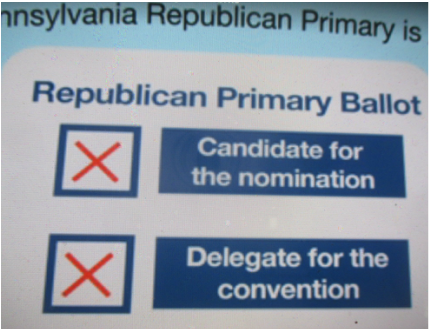|
Until this election cycle I truly didn't how little I understood the presidential election process in our country. Mayhaps I'm not the only one having a demon of a time trying to figure out this Democrat/Republican/primary/caucus/delegate/superdelegate thing. Some state primaries, such as ours here in Ohio, are fairly straightforward and easy enough to understand: on the Republican side, whoever gets the most votes gets all the Convention delegates and on the Democrat side the delegates are divided among the candidates proportional to the votes received. In places like Iowa, on the other hand, they pick a night to duke it out for delegates in school gymnasiums and church halls, and then there's places like Colorado, where they pick their convention delegates by some arcane process by the light of the moon and a puppy dog's tail. (There's no sense even trying to figure out what goes on in Colorado). And then there's the Pennsylvania Republican primary, which is being played out even you read this (provided you're reading this on Tuesday, April 26 before 8 pm Eastern Daylight Savings Time), which can only be understood by persons possessing at least 2 1/2 college degrees, one of them in Political Science. ...who, with the assistance of an article in the New York Times on the subject, helped me deconstruct the process of how the Pennsylvania Republican primary works. Anyway, the way the Pennsylvania Republican primary works, as I understand it, - not that I can understand why anybody would do it this way, but oh well - is that Pennsylvania will send 71 voting delegates to the Republican National Convention to vote for a presidential candidate. Of these 71 delegates from Pennsylvania, 17 will be committed to voting for whoever received the most votes in the primary election.* But the other 54 delegates, whom Pennsylvanians vote for along with their choice for presidential candidate, ...are uncommitted, and can vote for which ever candidate they want at the Convention, which is really only an issue in a case where one candidate has not reaped enough committed delegates to wipe out all the competing candidates for the nomination - in other words, in a case such as this year's election may turn out to be ...and subsequently prevent him from arriving at the National Convention with the 1,237 committed delegates he needs to win the nomination on the first ballot. Anyway, Pennsylvania has 18 congressional districts, each of which will today elect 3 vote-for-whoever-they-want delegates from a slate of 162 people running for the 54 slots. Got it so far? So, in short, today in Pennsylvania if you are a voting Republican, you are voting: 1) for your choice for presidential nomination and, 2) for three delegates who will vote at the Republican Convention, hopefully for the same candidate as you voted for today. Which begs the question: How do you know that the delegate you're voting for will vote for your man at the Convention? Well, in truth, you don't. As one Pennsylvanian who planned to vote for John Kasich told The New York Times, "If I want a delegate who's going to vote for John Kasich, then how would I know?" Apparently one could have researched the positions of each of the delegates running in one's district to find out which candidate each is committed to, if one had the time and devotion to do so; and then one would have to trust that the delegate one voted for would remain true to their word by the time the Convention rolls around. Fellow Buckeyes of the Republican persuasion: does it not make you feel happy, at least once every four years, to be from Ohio? ;) * If, however, on the first round of voting no candidate receives the 1.237 votes required to win the nomination, there is second round (followed by as many subsequent rounds as necessary) in which the previously committed delegates will be free to vote for whomever they want.
References: 1. "GOP Delegate Job Is Out Of Obscurity", by Jeremy W. Peters and Trip Gabriel, The New York Times, Friday, April 22, 2016. 2. http://videos.pennlive.com/patriot-news/2016/04/republican_primary_how_the_pen.html#incart_article_small
0 Comments
Leave a Reply. |
"Tropical Depression"
by Patti Liszkay Buy it on Amazon: https://www.amazon.com/dp/B0BTPN7NYY "Equal And Opposite Reactions"
by Patti Liszkay Buy it on Amazon: http://amzn.to/2xvcgRa or from The Book Loft of German Village, Columbus, Ohio Or check it out at the Columbus Metropolitan Library
Archives
July 2024
I am a traveler just visiting this planet and reporting various and sundry observations,
hopefully of interest to my fellow travelers. Categories |












 RSS Feed
RSS Feed